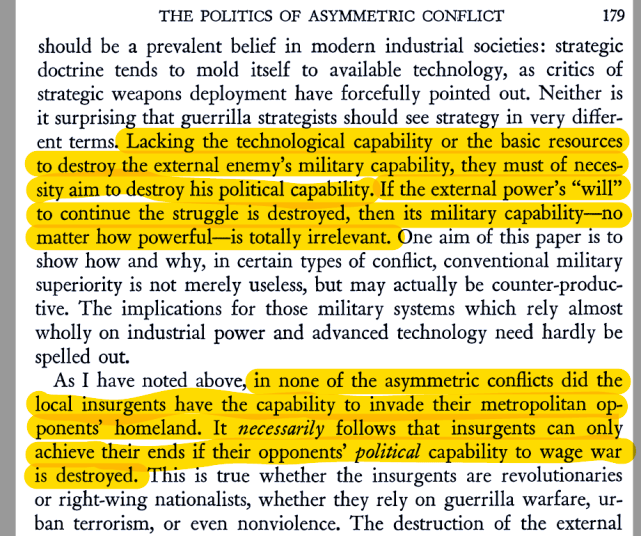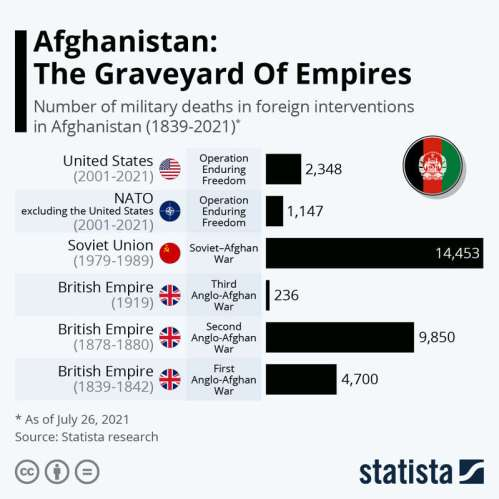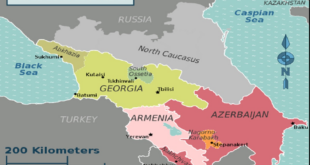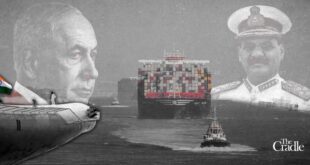Back then, after September 11, 2001, in Washington and New York, everybody talked about who could have done it, how they did it and with what means. The only thing never brought to the fore was: WHY would somebody want to do something like 9/11 to the United States of America?
By not asking the Why question, the US could stand as the innocent victim of cataclysmic violence. It would not have to do any soul searching and therefore no change of its global militarist policy. 9/11 was not a response to US foreign policy – but it needed a response. The world felt sympathy for the American suffering – much more so than for the suffering and deaths in other countries around the world.
The fact is that the 9/11 attack targeted the US’ global finance-capital (World Trade Center), its global military (Pentagon) and its political (White House, however not hit) centres – not a school, train station or energy facility. The significant symbolic meaning of these targets could have stimulated intellectually decent causality discussions – and so too if Osama bin Laden’s writings about US global dominance and destruction since Hiroshima and Nagasaki had been taken into account.
In short, might makes right – so what were there to discuss? By tabooing the Why? – the George W. Bush administration’s response could then be made completely out of proportion to the 9/11 suffering.
If you wonder what I mean by out of proportion, the Brown University “Costs of War” project tells you what the US has done in response to max 2500 Americans being killed on 9/11 during the now 20-year long Global War On Terror, GWOT, that it started right after 9/11.
Most likely, the last 20 years of this mind-boggling and disturbing death and destruction in Afghanistan could have been avoided – that is, if the US did not have an unchangeable plan for that primitive mass-destructive revenge. If the Bush administration had negotiated with the Taliban and had gotten Osama bin Laden out of Afghanistan, there did not need to be a war since no one involved in 9/11 was an Afghan. He would have been on trial somewhere and found guilty or not guilty.
As you may remember, the Taliban were willing to deliver bin Laden if the US would provide documentation that Osama was involved in the 9/11 attacks – here The Guardian’s report of October 14, 2001.
But back then – like today with the genocide accusation industry against China – the US doesn’t believe in documenting anything. What it says, with God on its side, is by its own definition simply true. Bush – who is probably the world’s largest but non-convicted war criminal because of Afghanistan and Iraq – refused to produce any documentation – most likely because there was none and the official truth about 9/11 leaves too many other questions unanswered.
And – remember – the Mujahedin before the Taliban – were strongly supported by the United States, Saudi Arabia, Pakistan and the United Kingdom because they fought against the Soviet invasion and occupation from December 1979 until Gorbachev announced in mid-1987 that the Soviet Union would withdraw. Here is a quite telling 1987 documentation with President Reagan telling you all about the US support for the Mujahidin as the voice of the Afghan people:
to the left and in the movie, Zalmay Khalilzad who has been in the US-Afghanistan game since 1987 but ended his “peace” work on August 15, 2021, in Doha. You’ll know what kind of personality he is when you learn that he has been involved as e.g. a Counselor at the Center for Strategic International Studies (CSIS), sits on the Boards of the CIA-related National Endowment for Democracy (NED) and also related to America Abroad Media (AAM), the RAND Corporation’s Middle East Studies Center, the Atlantic Council, the American University of Iraq in Suleymania (AUIS), The American University of Kurdistan (AUK), and the American University of Afghanistan (AUAF), Unocal, Chevron, the Turkmenistan–Afghanistan–Pakistan–India Pipeline, has written lots of papers arguing for US hegemony with all necessary means and has been an ambassador to Iraq, involved in the sanctions on Iran and… More about this “peace”-maker here and here.
What conclusions to draw from August 15, 2021?
The mainstream discourse on the defeat of the US in Afghanistan has a series of foci. One is the obvious failures of the way the Biden administration ended this war – and the heart-breaking iconic scenes at Kabul Airport. Another is on what could have been done differently during these 20 years, not the least on the military side.
You’ll also find the focus on how Afghan women and girls post-August 15 will suffer a huge setback. Deutsche Welle makes a scoop-like interview with former president George W. Bush about Biden’s withdrawal plan, but doesn’t ask him – the top responsible policy-maker of that 20-years war on and in Afghanistan and the Global War On Terror – how he thinks and feels about it all today. DW just lets him say that he thinks the withdrawal is a mistake and talk at length about how he knows and empathizes with the women of the country. Thereby the implicit message is conveyed that the US invaded Afghanistan to liberate the women of that country.
Of course, George W. Bush was not the only one responsible, another was Donald Rumsfeld, his Secretary of Defence at the time who, according to The Daily Beast, was a cool killer of some 400 000 people.
We have yet to see a media offering just some of the substantial arguments why this war was wrong, immoral and unnecessary from October 7, 2001, to this very day. And why that sort of war never succeed.
The MIMAC- Military-Industrial-Media-Academic Complex – shall never stimulate you to think critically about war itself.
Your author here has never been to Afghanistan and this conflict has also never been a main focus of TFF’s work. But we know a little about international conflict analysis and resolution, mitigation, mediation, reconciliation, nonviolence and peace-making. And we’ve been involved in a series of conflicts since Yugoslavia in 1991.
On the basis of this, I would draw the following conclusions about the US-led war on Afghanistan and its end on August 15, 2021:
1 • It was a cynical response to, or revenge for, 9/11 totally out of proportion to the suffering of the American people on that day; 9/11 was not a military attack and no international border was crossed but it was a terrible act of violence. By defining it as a war and never allowing the “Why?” question to be discussed openly, everything went wrong – also for NATO that activated its paragraph 5. Terrorism is not the same as war and terrorism cannot be eradicated by killing terrorists – as little as diseases can be abolished by killing all patients. To put it crudely, this response and the GWOT smelled militarist stupidity, anti-intellectualism and overblown victim psychology from Day One.
2 • If the US had not had such an overwhelming military power (about 40% of the whole world’s military expenditures), it would have been forced to think, use diplomatic means, take up the 9/11 attack on it at the UN, invest more in intelligence and early warning etc. – in short, come up with an intelligent political response. But that was prevented because of the militarist foundation of US foreign policy and the lack of will to discuss the big Why? question.
To the one who has only a hammer in his toolbox, every problem in the house looks like something that must be hammered down.
3 • Big powers which are otherwise in decline are likely to cling to one type of power – the military, the last thing the US is second to none on. You can use that for many purposes but, beyond everything else, show to the world that you are a superpower and convince yourself that you are invincible.
There are accounts that this war was prepared before 9/11 took place – here is BBC’s report. If so, 9/11 was only the pretext and it explains also Bush’s refusal to deliver documentation for bin Laden’s involvement in 9/11. In one of the best analyses written about this whole thing in a few pages, peace researcher and TFF Associate Hakan Wiberg explains:
“Following World War II, the U.S. dominated the world military, economically and, in the
eyes of many, even morally. But the reputation of the United States as a champion of
democracy, human rights and other good things has been severely damaged by the
Vietnam War and numerous other factors; and its economic standing is in a state of what
may be irreversible decline due to internal weaknesses, the growing strength of
challengers such as China and India, and the over-extension of its empire.
That leaves the military sphere as the sole basis of dominance. Against that background,
“war for the sake of war” becomes a likely explanation for the aggressive behaviour of
the United States. War serves a variety of purposes, one of them being to inflate the
importance of the military dimension in international affairs: “There, you see — it is
military power that really counts”. Another is to motivate and discipline allies, the classic
formula being: “This is a test of the credibility and resolve of the world community [sic].”
Yet another function of aggressive war is to intimidate other nations by demonstrating
that the United States, like other great powers before it, tends not to regard itself as
constrained by international law.
Fighting a war is thus a means to preserve superpower status; winning, or at least
appearing to win, is a welcome bonus. Tending to support this hypothesis is the fact that
the U.S. wars against Yugoslavia, Afghanistan and Iraq were all decided upon well in
advance: in the case of Yugoslavia, several months before the sham peace negotiations at
Rambouillet; in the case of Afghanistan, several weeks before the 9/11 attacks; and
almost a year before the Security Council debate on Iraq in February of 2003.”
4 • The military, political and moral defeat in Afghanistan – together with the defeats in Iraq, Libya, Somalia, Syria – must mark the final end of the – mad – Global War on Terror, GWOT. It has only created more terrorism worldwide and costs heart-breaking suffering and unbelievable sums wasted for other constructive global problem-solving. The Costs of War project states US$ 2,261 trillion (and the above human costs). The net result of the US-led Global War on Terror, over twenty years is that 16 000 people die annually now in terror attacks, while 405 in 2000, i.e. before 2001. That is a 40 times increase in the problem supposed to be solved! And Afghanistan is still the world’s hardest hit. GWOT must be the most counterproductive war ever fought.
5 • A classical fact of our times is that big nations lose wars in small countries. Andrew Mack wrote the analysis about it in World Politics in 1975 in the wake of the equally self-humiliating US withdrawal from Vietnam:

In other words, one major historical fact about a-symmetric war interventions was overlooked. The Bush administration thought – like all before and after it – that the United States could get away with everything and needed learning no lessons from the past whatsoever. But the fact is that poor peasants in Vietnam and 70 000 Taliban with Kalashnikovs and some stolen US equipment was more than history’s biggest military could handle.
It’s called hubris combined with an utter lack of intellectual and moral input into decision-making and it is a sine qua non of the MIMAC – Military-Industrial-Media-Academic Complex that runs outside democratic control but is the single most important structure of US foreign policy. The US doesn’t have a MIMAC – it is a MIMAC.
Therefore, the US’ political – and economic – capability to conduct war year after year with accumulating negative results for itself of course comes to an end. Internal dissent in the aggressor’s political and economic circles will grow – as we see also now at the moment of withdrawal.
6 • If you want to fight, non-material values and motivations are much more important factors than material, economic and military factors. The US has spent – wasted – no less than US$ 83 billion on developing and training the official Afghan military forces, according to Defence One. Some 300.000 Afghan military personnel were trained and equipped with advanced US weaponry – in the incredibly naive belief that that would enable the US puppet/poppies corrupt leaders in Kabul to win over a well-organised and super-motivated guerilla force.
It’s a reasonable hypothesis that Taliban was able to gain control of all of Afghanistan because of a fact we are not supposed to consider, namely that the Taliban must have quite some support in the hearts and minds of the Afghan people and that they see hope – along with fears, of course – in that they are now going to run their country without the US/NATO interference. Why should that not be felt as a liberation after 20 years of occupation?
Incidentally, President Biden in his own way made a non-material dimension the main argument in his defence of the withdrawal on August 16, 2021: the new Afghan army did not have the will to fight for its own people’s future and such a will cannot be imposed from the outside, as he states it here:
This is a new version of an old story: Mohandas K. Gandhi won the battle against the British Empire without weapons and big budgets – but with brilliant civilian tactics, clear moral principles, personal communication, a long-range vision and an existential national survival perspective: You British can stay if you want but your system must go. These are all non-material “weapons.” The US system in Afghanistan of course, likewise, had to go.
But the West has never understood these things, least of all its colonial and/or imperialist missionary powers. They don’t read “The Art of War” by the Chinese general and philosopher Sun-Tzu from about 2500 years ago: “The supreme art of war is to subdue the enemy without fighting ” – sounds like the Taliban taking over Afghanistan in a couple of weeks – and “If you know the enemy and know yourself, you need not fear the result of a hundred battles. If you know yourself but not the enemy, for every victory gained you will also suffer a defeat. If you know neither the enemy nor yourself, you will succumb in every battle” – the latter a description of today’s America.
7 • All empires decline and fall. At some point. You expand horizontally into more and more countries and cultures and deeper and deeper into their economic, political intelligence, cultural and other spheres. There is no end – imperialism and militarism know no logical, rational limits. The only routine answer is more and more and while there are no limits to quality, there are limits to quantity: You cannot win all battles given your ever-larger global reach.
The US has won no interventionist war – politically, morally or militarily – since 1945, but it has incurred unspeakable suffering, death and destruction, made itself hated by millions where it could have been loved and eroded its own economic, political and moral power vis-a-vis the rest of the world. Should it now try a Cold or hot war against China or, say, Iran – it will be the end.
8 • The war on Afghanistan and this hugely self-humiliating and tragic defeat and shameful withdrawal will serve as yet more nails in the coffin of US militarism and imperialism. It will accelerate the decline and fall of the US Empire. If there is anything good about August 15, 2021, it is precisely this: the crumbling of the Empire and its soon-to-come dissolution – which will mean NATO’s dissolution too. NATO’s various roles and missions in Afghanistan are way outside its own treaty, the North Atlantic Treaty of 1949.
The Soviet Union was formally dissolved on December 25, 1991, 4,5 years after Gorbachev had announced the withdrawal from Afghanistan. The situation of course is very different in the United States, but it would be good for the world and the US itself if its Empire dissolves even faster, say by 2025.
That dissolution will make both the US a better country and the emerging new multi-polar world a much much better place for us all. The US Empire has now become what President Reagan termed the Soviet Union with some right in 1983:
Please note what he says about where evil is conceived. It applies to the US today. Self-righteous and exceptionalist militarism, warfare and delusional global dominance addiction seem to have become the new – fake – god to worship. The meaning of the Empire is – the Empire and its maintenance.
All Empires fall when they’ve become evil enough. And other empires have been buried in Afghanistan before:

What was it we said all the time?
Yes, I know! It is considered bad manners to point out that we were right and ‘they’ were wrong – even when it is obviously true. But – is it wrong to say that a doctor who makes a correct diagnosis and prognosis and recommends a particular treatment that brings the patient health and happiness is a better doctor than s/he who gets it all wrong and causes the patient unnecessary suffering and death?
One quality criterion of social science is whether or not it makes precise predictions. At TFF we did that in 2001: We said, don’t do it because you’ll never succeed with this militarist approach in Afghanistan.
Western ministries, think tanks, research institutes, military and civilian experts had recommended the US aggression on Afghanistan that took place on “10/7” as an appropriate, proportionate, legal and moral response to the violence incurred on the US on September 11 – “9/11” – at which less than 3000 died many of which, by the way, were not American citizens. And the mainstream media had no space for alternative interpretations.
They had million-dollar budgets from governments and corporations but had no scientific quality; such commissioned research where the outcome is given a priori simply doesn’t. At TFF, we operate on an annual shoestring budget, but we have some knowledge and experience – also from on the ground in conflict zones – and we’re exclusively people-financed and all-volunteer: We do free – not commissioned – social science guided by the UN Charter norm that peace shall be established by peaceful means.
On the occasion of this US defeat in Afghanistan, we identified about 70 articles – the far majority by TFF Associates – that we published between 1999 and now with “Afghanistan” in their title. TFF’s earlier and present homepages hold far more articles on terrorism, 9/11, US foreign policy which make mention of Afghanistan but are not included below.
Without exception, these articles either warned against the invasion on October 7, 2001, that it was a wrong interpretation of 9/11, immoral, and out-of-proportion; or they state that the war would never succeed and was a huge violation of international law – or that the 9/11 terrorism could not be defeated by the war on Afghanistan and the GWOT. Several later articles argue for withdrawal now.
To put it crudely – the mean sentence is factually relevant today: What was it we said all the time, over 20 years?
And we were right, they – with all their resources – were wrong.
 Eurasia Press & News
Eurasia Press & News




